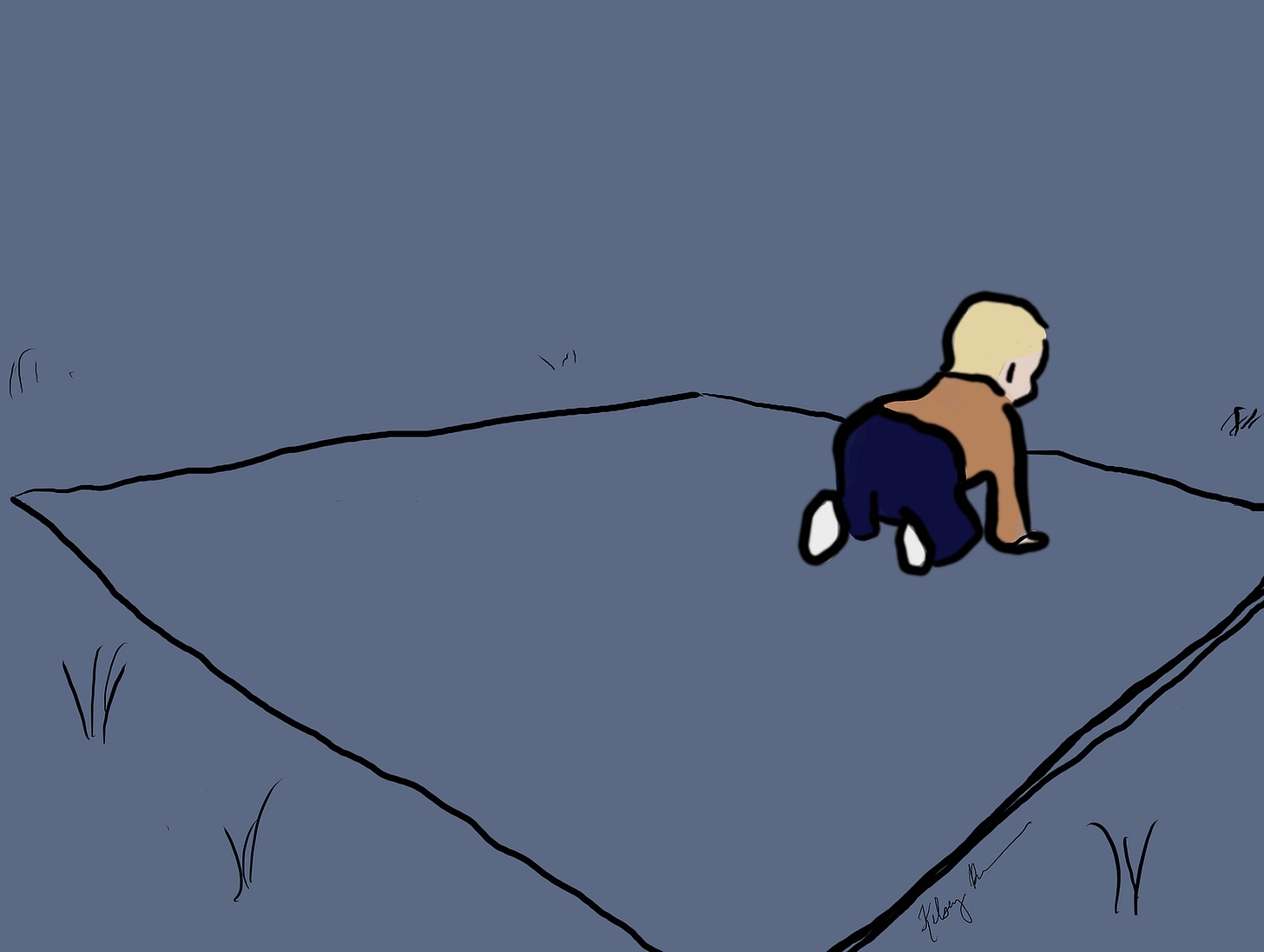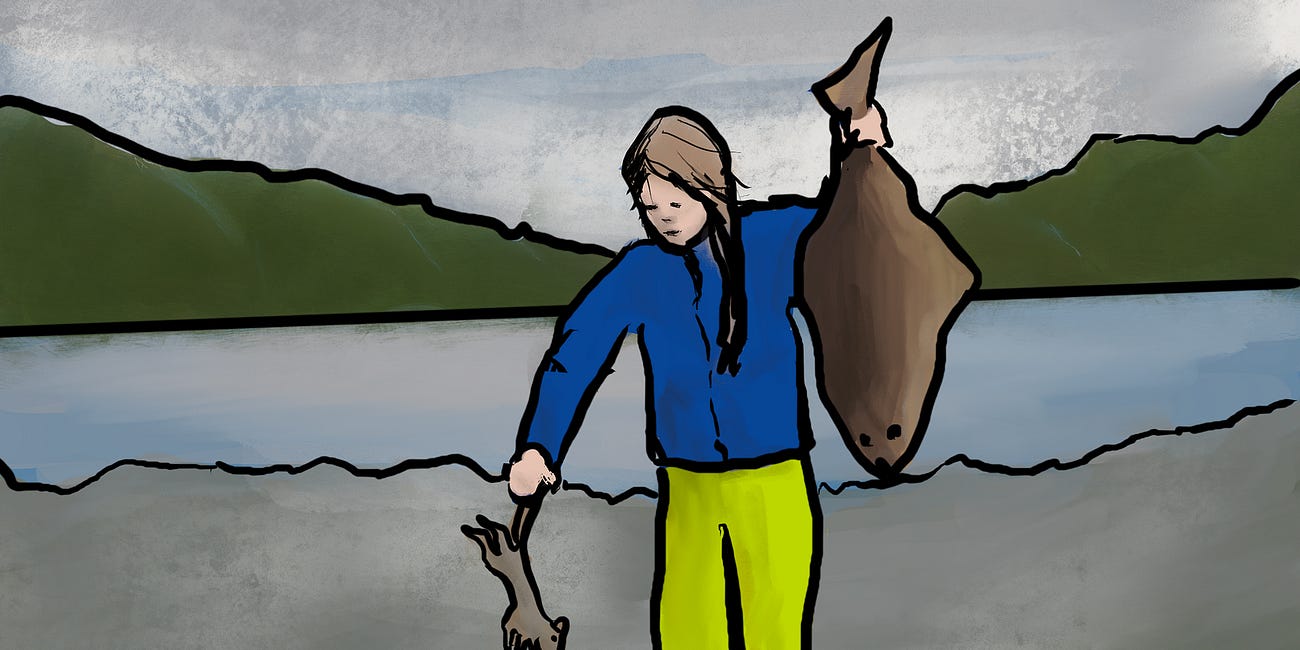Crawling Towards Autonomy
A mother and baby learn to move—and to separate
I am boring the baby. He’s sitting on the kitchen table, playing with container lids. Or rather, I’m trying to get him to play. His alert little face is seeking novelty elsewhere.
I don’t blame him. This fidgety “entertainment” is just as mindless for me: a nothing-game wrought from the endless mothering hours. But now that the baby is more capable of engaging with the world, he needs more. And with the sleepless fog clearing from my brain, so do I.
We don’t have a lot of toys. For the first three months, the baby liked any toy that could be dangled or made a sound. The dangling mirror, especially. At months four and five, the crinkly newspaper toy and chewy rubber giraffe were all we could ever need.
But he’s six months now. He wants the curving edges of the dinner spoon. The rattle and clatter of a teaspoon set as he bangs them against the floor. Anything he can reach with those grabby hands and shove into his mouth.
My father carves the bark off a piece of red cedar from the kindling pile and ballpoint-pens a face. The baby holds it and whacks the table as he sits on my lap at meal time: just enough distraction to free up my other hand to eat.
He drops it to the floor to make a swipe for my plate. I feed him chunks of fish with my fingers, to hums of delight.
When he tires of the eating game, I set him down on the floor, where he grabs for his carved stick. Rapt, he examines it at arm’s length.
“Is this a dagger which I see before me,” I quote on his behalf, “the handle toward my hand?”
I let our little Macbeth play with his cedar stick, trusting him not to put his eye out while I finish my dinner. His focus and fascination is key to my own freedom: the more he can do his own thing, the more I can do mine.
At six months old, the baby started sitting up unassisted. Two weeks later, he can crawl. It’s not “crawling” to satisfy a pedant, but his reaching-clawing slither satisfies my functional definition: he can get from point A to point B.
I marvel at the neat match to my own locomotion. Pinned to the spot by a needy baby, my postpartum body has taken all these months to heal. But at last, the relaxin hormone that has been holding my joints ajar since early pregnancy seeps from my body. I can hike without my hips aching. Playing with the baby on the floor, I discover that my wrists don’t hurt.
“Not being pregnant is so great,” I try to stop saying in my head. We’re planning to have more kids. But it really is great. I have so much more energy than I’ve had since pregnancy started. I’ve spent nine months as a walking womb, and another seven as an injured incubator. Finally, I’m coming back to myself.
I get invited to kayak polo, a sport I’ve never heard of. It turns out to be a contact sport with a hand-thrown ball: low stakes but high intensity.
Without the baby babbling from the backseat, I have the unshakeable sense of having forgotten something important. But it’s amazing, being just me. I kayak sprint hard for two hours up and down the course. I twist and block and collide: kayak to the chest, defensive maneuver. I fall in.
The drive back is the most time I’ve had inside my own head for weeks. I have an audiobook queued up, but I can’t bring myself to press play.
Only one month since he could first sit up, the baby can climb a flight of stairs on his own.
He reaches for power sockets, yanks electrical cables. He pulls to standing on boxes and furniture, retrieves objects from high places, and has even started to cry less often when he falls down.
“Vavavavavava,” he babbles. “Dadada.”
He’s capable but unaware of limits. He can go up stairs, but would happily launch himself from heights. So we follow him everywhere he goes.
After the boy has crawled from living room to upstairs bedroom, he becomes fascinated with a mat on the floor. Long minutes pass, and he doesn’t even look to check in with me. He’s exploring texture, action and reaction. Lift the corner, let it fall.
He’s entertained, but I haven’t brought anything for myself. Any time not directly engaging the baby still feels precious, so my unbusy hands twitch with the need to do something.
I break. A calculated risk, I shut him into the room and run for my knitting basket.
My heart’s in my mouth as I sprint: down the stairs, through the hall, all the way back. I expect tears. But when I come back, he hasn’t even noticed my absence — hasn’t missed me at all.
That’s new, too.
I love the baby. They say around nine months, the little one starts to realize that the mother is a separate creature. But nobody talks about the mother’s separation anxiety: the reptile-brain sensation that in fact this other body is still your body too.
His independence is heartbreak and pride and relief all balled together, so tight you can’t tell which is at the center. He’s becoming a person. If he can pass time by himself, so can I. And it’s amazing: he’s so capable, already!
But already, a whisper at the back of my mind reminds me: he will never need me as much as he once did. Part of growing up is growing away. Of course, his life is his own — but I hadn’t expected to feel it so soon.
It’s evening. The baby is crawling around the living room floor. “Mamamamamamama” is still his favorite phrase, and I don’t mind it.
I’m lying on the floor, and Mouth Boy is tired. He goes for my face — available because I’m tired, too.
There’s the whack of a hand toward my lips. A frame-filling view of a mouth, gummy smile turned lethal with teeth.
“Haaa,” my baby chortles, warm wet lips closing on my eyelid and cheek. “Aha, heh, heh.”
I fend him off as well as I can, laughing. It’s funny and horrible, painful, gross, sweet. This is who we are to each other, right now.
Previous: The Work of Killing



